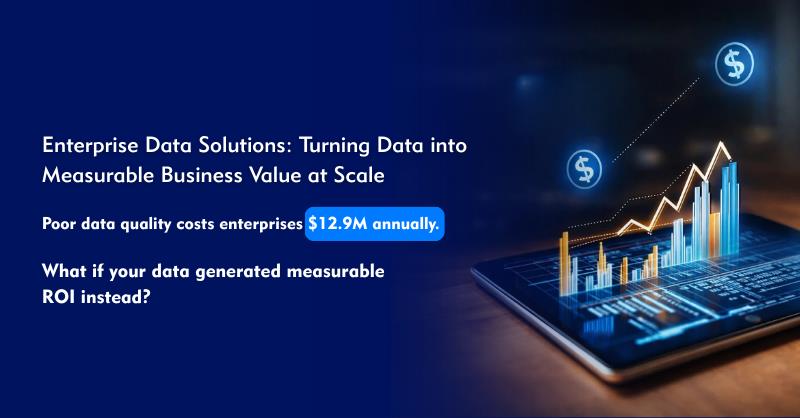
Predictive Analytics for Enterprises: Fueling Data-Driven Decisions for Growth
In today’s data-rich environment, enterprises are increasingly turning to predictive analytics to stay competitive and proactive. By analyzing historical data to forecast trends, predictive analytics empowers businesses to optimize operations, anticipate customer needs, and drive innovation. However, harnessing its full potential requires overcoming common hurdles, from data integration to talent gaps. This blog delves into how enterprises can effectively implement predictive analytics and highlights the transformative value it can bring.
Challenges in Predictive Analytics Implementation
While the benefits of predictive analytics are compelling, enterprises often encounter significant challenges:
- Data Quality and Integration: Data is the foundation of predictive analytics. However, 72% of businesses cite poor data quality as a primary obstacle to effective analytics. According to a Harvard Business Review survey, over 45% of companies say data silos impede their ability to deliver reliable analytics insights.
- Infrastructure Modernization: Predictive analytics can demand substantial computational power, especially when processing large datasets. The global shift to cloud-based platforms, like those by AWS and Google Cloud, has helped mitigate infrastructure constraints, enabling enterprises to analyze data in real time and at scale.
- Talent Shortage: The talent gap in analytics remains a pressing issue. In a 2023 survey, Gartner reported that 68% of enterprises struggle to hire skilled data professionals capable of managing and analyzing complex datasets.
- Privacy and Compliance: As organizations analyze increasingly sensitive data, compliance with data regulations (e.g., GDPR, CCPA) is crucial. A Deloitte study found that 67% of enterprises are investing in data governance and security to ensure compliance and protect data integrity.
Strategies for Success in Predictive Analytics
Despite the hurdles, enterprises can unlock predictive analytics’ value through focused, strategic efforts:
- Fostering a Data-Driven Culture: A successful predictive analytics strategy begins with a commitment to data-driven decision-making. Educating employees on data literacy and promoting analytics tools across departments enhances organizational readiness and maximizes analytics’ value.
- Modernizing Data Infrastructure: Upgrading to cloud-based or hybrid platforms provides the scalability and agility required for predictive analytics. In 2024, 56% of enterprises transitioned to cloud-based analytics, enabling them to process and analyze data at unprecedented speeds and accuracy levels.
- Implementing Cross-Functional Collaboration: Successful predictive analytics programs involve cross-departmental collaboration, aligning data scientists with business leaders. According to McKinsey, organizations that implement collaborative analytics projects report a 40% improvement in project success rates.
- Robust Data Governance: To ensure high-quality data and regulatory compliance, enterprises must establish clear data governance policies. A PwC study found that companies with structured data governance reduced analytics errors by 20%, underscoring its importance for successful predictive models.
Immediate Business Impact of Predictive Analytics
Predictive analytics brings quantifiable benefits that can impact a business’s operations and revenue.
- Operational Efficiency: Predictive analytics optimizes resource allocation, forecasts demand, and anticipates equipment maintenance needs, reducing costs by up to 30%. For instance, predictive maintenance can extend equipment lifespan and minimize downtime.
- Enhanced Decision-Making: By forecasting trends, predictive models enable data-driven decision-making. Enterprises that leverage predictive analytics report a 15% improvement in operational responsiveness, allowing them to adjust strategies promptly.
- Improved Customer Retention and Engagement: Predictive analytics can identify at-risk customers, enabling timely interventions to improve retention. According to Forrester, businesses using predictive models in customer engagement report a 20% increase in retention rates, attributed to personalized, proactive interactions.
Industry-Specific Applications of Predictive Analytics
Predictive analytics is revolutionizing operations across various industries, adding efficiency and value:
- Retail: Retailers use predictive analytics to manage inventory, anticipate demand fluctuations, and tailor promotions, with McKinsey estimating a potential 15% increase in profitability through better inventory management.
- Healthcare: Predictive models in healthcare enable early disease detection and personalized treatments, which could save the industry up to $150 billion annually by 2026, according to Accenture.
- Finance: Financial institutions leverage predictive analytics for real-time fraud detection and risk management, with a 30% reduction in fraud rates reported by institutions investing in advanced analytics.
- Manufacturing: In manufacturing, predictive analytics minimizes downtime by forecasting maintenance needs. Deloitte estimates a 20% reduction in maintenance costs for companies utilizing predictive analytics for preventive maintenance.
Ensuring Ethical and Responsible Analytics
As predictive analytics becomes more integrated into decision-making, maintaining ethical practices is paramount. Transparency, accountability, and fairness are essential, particularly as businesses handle sensitive data. Adhering to established frameworks for ethical analytics ensures that organizations can harness the power of predictive analytics while maintaining public trust.
Predictive analytics empowers enterprises to make proactive, data-informed decisions, optimize resources, and improve customer experiences. However, fully leveraging its potential requires a strategic approach to data quality, infrastructure, and cross-functional collaboration. By fostering a data-driven culture, investing in modern infrastructure, and upholding data ethics, enterprises can unlock the full potential of predictive analytics and gain a sustainable competitive edge.
Explore how Narwal’s Data Services can help your organization leverage predictive analytics for growth.
Learn more at [Narwal Data Services]
References:
- Harvard Business Review – “The Data Management Challenge”
https://hbr.org/2022/04/the-data-management-challenge
- Gartner – “Companies Struggle to Hire Skilled Analytics Professionals”
https://www.gartner.com/en/newsroom/press-releases/2023-01-19-gartner-says-companies-struggle-to-hire-skilled-analytics-professionals
- Deloitte – “Privacy and Protection Predictions”
https://www2.deloitte.com/global/en/pages/risk/articles/privacy-and-protection-predictions.html
- McKinsey – “Embedding Analytics in Business”
https://www.mckinsey.com/business-functions/mckinsey-analytics/our-insights/embedding-analytics-in-business
- Forrester – “Why Predictive Analytics is Essential for Customer Retention”
https://www.forrester.com/report/why-predictive-analytics-is-essential-for-customer-retention/
Related Posts

Enterprise Data Solutions: Turning Data into Measurable Business Value at Scale
In today’s digital economy, enterprise data solutions have become the backbone of strategic decision-making, operational efficiency, and AI-driven innovation. Organizations generate massive volumes of structured and unstructured data across ERP systems, CRM platforms, SaaS applications,…
- Feb 26

Top 7 Data Trends for 2026: Redefining Data Engineering, Monetization, and Transformation
By Sachin Kumar, VP & Head of Data January 2026 Enterprise data is no longer a passive asset waiting to be queried. It is becoming active, autonomous, and increasingly responsible for driving decisions at machine speed. …
- Jan 19
google-site-verification: google57baff8b2caac9d7.html
Headquarters
8845 Governors Hill Dr, Suite 201
Cincinnati, OH 45249
Our Branches
Cincinnati | Jacksonville | Indianapolis | London | Hyderabad | Bangalore | Pune
Narwal | © 2024 All rights reserved





Comments (2)
zoritoler imol
Jan 24, 2025When I originally commented I clicked the -Notify me when new comments are added- checkbox and now each time a comment is added I get four emails with the same comment. Is there any way you can remove me from that service? Thanks!
zoritoler imol
Feb 04, 2025Respect to article author, some fantastic entropy.